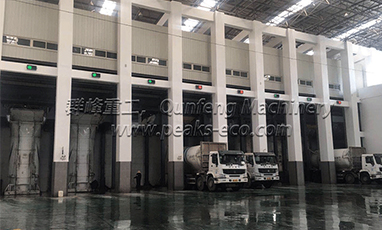Nowadays, garbage transfer stations in big cities are the main treatment sites for domestic garbage. The garbage is “digested” through incineration or landfilling. However, the air at many garbage transfer stations smells very unpleasant and has become an important source of urban pollution. The sanitary treatment of the garbage disposal station is not in place, so it is also an area with a high incidence of many diseases. After the deodorization equipment is widely used in the garbage transfer station, the odor has been well contained.
Garbage odor is caused by the fact that domestic garbage contains more organic matter such as leftovers, vegetable roots, leaves, poultry, animal and fish skin, hair, fat, scraps, etc., and a certain amount of moisture. Poor ventilation and the action of microorganisms will produce a certain amount of odorous gases such as ammonia and organic amines, which are commonly referred to as garbage odors. Because a large amount of domestic garbage is produced in residential areas, the collection and treatment of garbage are also built-in densely populated areas. In this way, the odor generated by the concentrated stacking of garbage disposal will inevitably cause pollution to the surrounding environment.
Because the odorous substances in the garbage transfer station are relatively mixed, the odor treatment equipment should also be more advanced to meet the requirements of odor treatment.

Waste Transfer Station Project China
Environmental protection measures to be taken in the Waste Transfer Station Project China:
(1) Prevent shredded paper, rags and other paper scraps and dust from drifting into the surrounding environment with the wind
(2) For the garbage stored in the transfer station, effective measures should be taken to prevent the dust and odor from polluting the surrounding environment
(3) The internal operation of the transfer station shall be organized and managed in strict accordance with the corresponding environmental safety regulations and procedures
(4) The transfer station is generally equipped with fire prevention measures to prevent long-term stacking of garbage from causing fires
(5) The transfer station must have anti-seepage treatment facilities to prevent the residual liquid produced by the garbage from infiltrating into the ground to prevent the groundwater from being destroyed
(6) The transfer station shall take a variety of preventive measures to reduce the noise generated by garbage handling machinery and transportation vehicles, and prevent noise pollution to surrounding residents
(7) The transfer station should minimize the negative impact on the environment and adopt comprehensive pollution prevention measures
(8) The transfer station should pay attention to the greening inside and outside the station to fully realize the harmonious coexistence of the surrounding environment
Dezhou Qunfeng Machinery Manufacturing Group has a good reputation. It is mainly engaged in complete sets of waste sorting equipment, waste compression equipment, waste transfer stations, vertical transfer stations, incineration systems, hydraulic flaps, and other related products. According to the different actual situations of the customers, we carefully formulate a satisfactory plan that meets the customers, and then implement the reasonable price.